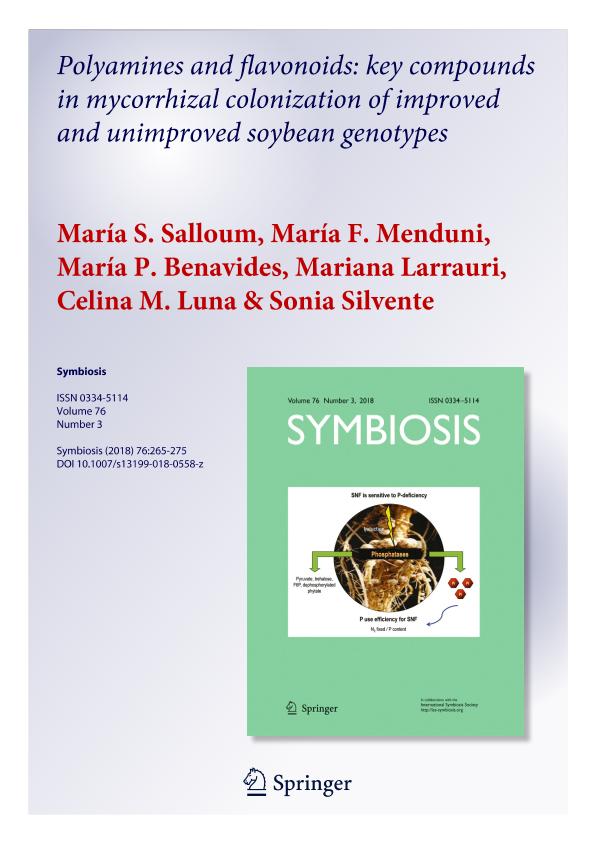Artículo
Polyamines and flavonoids: key compounds in mycorrhizal colonization of improved and unimproved soybean genotypes
Salloum, Maria Soraya ; Menduni, Maria Florencia
; Menduni, Maria Florencia ; Benavides, Maria Patricia
; Benavides, Maria Patricia ; Larrauri, Mariana
; Larrauri, Mariana ; Luna, Celina Mercedes
; Luna, Celina Mercedes ; Silvente, Sonia Teresa
; Silvente, Sonia Teresa
 ; Menduni, Maria Florencia
; Menduni, Maria Florencia ; Benavides, Maria Patricia
; Benavides, Maria Patricia ; Larrauri, Mariana
; Larrauri, Mariana ; Luna, Celina Mercedes
; Luna, Celina Mercedes ; Silvente, Sonia Teresa
; Silvente, Sonia Teresa
Fecha de publicación:
11/2018
Editorial:
Springer
Revista:
Symbiosis
ISSN:
0334-5114
Idioma:
Inglés
Tipo de recurso:
Artículo publicado
Clasificación temática:
Resumen
Modern breeding programs might have caused a reduction in plant responsiveness to arbuscular mycorrhizal fungi (AMF). Flavonoids and polyamines (PAs) are hypothesized to play a role in this symbiosis. We tested the effects of them in AMF roots of improved (I-1) and unimproved (UI-4) soybean genotypes, under the hypothesis that domestication decreased their concentration in roots, affecting AMF colonization, particularly arbuscule formation. After 20 days of treatment, AMF roots of UI-4 genotype had greater amount of total flavonoids/phenols and PAs while in I-1 genotype no differences were observed between roots of mycorrhizal (M) and non mycorrhizal (NM) plants. Exogenous application of flavonoids led to an increase in arbuscules in both genotypes. Improved-1 genotype needed higher levels of flavonoids to reach the percentage of mycorrhization achieved by UI-4 control. In regard to PAs, mycorrhizal plants of both genotypes had higher endogenous concentration than NM plants, however, the highest concentration, especially of putrescine (put) was in UI-4 M genotype. To check the participation of put in symbiosis we used RNAi silencing methodology. Down regulation of the GmADC transcript, involved in put formation, had a profound negative effect on mycorrhizal colonization and also affected the normal development of the plant. By contrast, down regulation of GmDAO, in which ADC transcript was expressed, arbuscule formation was similar to control plant. Our results suggest that mycorrhizal colonization is affected by soybean domestication particularly arbuscule formation and this effect seems to be mediated by the endogenous roots levels of flavonoids and PAs, especially put.
Archivos asociados
Licencia
Identificadores
Colecciones
Articulos(CCT - CORDOBA)
Articulos de CTRO.CIENTIFICO TECNOL.CONICET - CORDOBA
Articulos de CTRO.CIENTIFICO TECNOL.CONICET - CORDOBA
Citación
Salloum, Maria Soraya; Menduni, Maria Florencia; Benavides, Maria Patricia; Larrauri, Mariana; Luna, Celina Mercedes; et al.; Polyamines and flavonoids: key compounds in mycorrhizal colonization of improved and unimproved soybean genotypes; Springer; Symbiosis; 76; 3; 11-2018; 265-275
Compartir
Altmétricas



